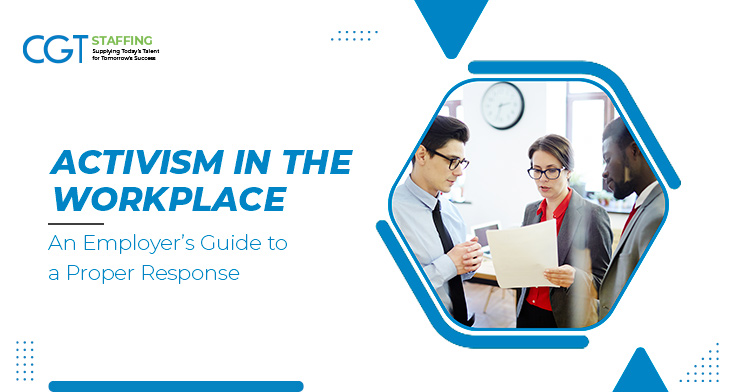With millennials (and now Gen-Z) becoming the dominant demographic in most workforces, workplaces are seeing far-ranging changes. One of these is the rise of activism, especially in response to changing social and political landscapes. This presents employers with a complex and challenging situation. They cannot always maintain neutrality, which might be perceived negatively by workers.
Even when supporting a popular narrative, companies have to consider the sensitivity of their existing customers and target market; at the same time, harsh actions like an insubordination write up in response to workplace activism could be even worse. How should employers correctly respond to workplace activism? This blog recommends the following approaches:
Table of Contents
Consider Significantly Redesigning Workplace Policy
There is no denying that the need for social and economic change will continue to be a seminal issue. It is reasonable to assume that activism in the workplace is going to increase in parallel. As workers become more aware of their individual power and responsibility when it comes to social, political, economic, or even environmental change, businesses can no longer afford to simply “wing it” with their responses.
One of the first logical steps, therefore, is for employers to reassess workplace policies. These policies rightly inform everything from defining different recruitment models to managing workforces. In particular, workplace policies may require an update in the context of activism, defining permissible activities and appropriate responses.
Participate in Charitable and Prosocial Causes
Corporate social responsibility is more than a public relations exercise. Employers (and customers) expect more from a modern, responsible company. As a result, businesses may need to increase their visibility and involvement with charitable or prosocial causes.
Doing so can help employers build greater social capital among both workers and customers. There can be several different ways to accomplish this.
One means of increasing social visibility is for companies to match employee donations to charitable causes. Donations to humanitarian organizations, disaster relief efforts, environmental organizations, and similar causes are key opportunities for businesses to support charitable giving in a responsible way. If positioned and leveraged correctly, this could even help strengthen a company’s talent acquisition strategy framework.
Allow Employees Flexibility for Volunteer Work
Thanks to social media and smartphones, people can access information and act on it far more quickly and cohesively than ever before. This, in particular, has contributed to both enabling activism as well as giving it much greater visibility. As such, it has become easier to organize demonstrations, both for positive and negative purposes.

Many such events can and do take place during business hours, and employers cannot simply prevent employees from participating in such demonstrations. Even if it is during working hours, preventing, or forcing employees to remain at work at such times could devolve into a PR disaster.
Instead, allowing flexibility in working hours could prove a much more appropriate response. Employees can volunteer in peaceable demonstrations and other activism without negatively affecting their work efforts. This commitment to finding a middle ground can also go a long way to improving an employee’s perception of his or her working environment.
Offer Employees Options to Choose Important Breaks
Diverse and inclusive workforces are the hallmark of progressive businesses. However, they can also be complex to manage, especially with activism and awareness levels being where they are. Employers cannot afford to appear insensitive or biased towards any of their diverse pools of workers.
This rightly encompasses religious events and observances, which can be very challenging to manage, as workers may hail from a multitude of religious, ethnic, social, and political backgrounds. A business can demonstrate its commitment to diverse workforces by allowing workers to celebrate the holidays most important to them.
Build an Empathic and Supportive Culture
Sometimes, the most impactful way for businesses to respond to workplace activism is to show empathy and extend the necessary support to their workforce as a whole. Modern employers need to be politically correct, and that includes valuing employee concerns and opinions.
In any case, businesses cannot afford to turn a blind eye (or deaf ear) toward how employees perceive them, and while taking political stances may not always be an option, the least an employer can do is allow its workers to feel heard.
Avoid Optimism, Apoliticism, and Quick Fixes
A quick look at the things that employers should avoid in their approach to workplace activism may prove useful. At the top of the list is the “optimism bubble”. For example, believing employees keep politics or social issues out of the workplace is an overly optimistic approach that is outdated as well.
Similarly, in many cases, employers cannot afford to remain apolitical. Remaining conspicuously neutral can impact not just employment relationships, but customer relationships as well. A misstep, or even a purely performative action, can quickly impact not just future business, but also future talent sourcing.
A mortgage staffing agency may find it harder to source workers for a firm perceived as being resistant to social change. Similarly, the firm may find it harder to find new customers who have the same perception. It may even end up losing existing customers, losing out on even more revenue.
So, in most cases, businesses cannot remain apolitical or live within the optimism bubble. Modern consumers and workers require more visible responses. On the other hand, employers must also carefully consider and weigh their responses. The stance on each instance of activism must be a measured one. A quick-fix approach will almost always prove ineffective.
